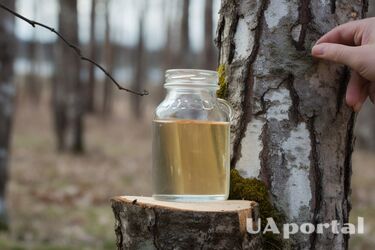Why you shouldn't drink birch sap often and how it can harm your health

Birch sap is a natural beverage containing many useful trace elements, such as calcium, iron, glucose, tannins, and organic acids. In particular, in spring, when our bodies need extra support, birch sap can help restore strength and vigor.
Read also: Why you shouldn't drink tea with milk regularly
This drink is especially recommended for people with diseases of the gastrointestinal tract, gallbladder, liver, and duodenal inflammation. It helps stimulate intestinal motility and soothe irritation. Birch sap also has diuretic, anti-inflammatory, and anti-allergic properties.
Since ancient times, birch sap has been known to have anthelmintic properties, and it is useful for people with frequent headaches, as well as during bronchitis, as it helps to cough up. In addition, this drink can be useful in case of intoxication, as it helps to remove sand, uric acid, toxins, and other harmful substances from the liver and kidneys.
Moreover, birch sap can be used for skin and hair care. It is useful for people with oily and combination skin, as well as freckles. It can also be frozen and used to rub the skin with ice cubes.
How birch sap can harm health
It's important to remember that not all birch sap is equally healthy. In some cases, this drink can even harm the body.
Canned birch sap does not contain any beneficial properties, and instead may contain a significant amount of sugar. Therefore, it should be consumed in small quantities, especially by children and those who are watching their figures. And people with diabetes should avoid sweet birch sap altogether.
Freshly collected birch sap is the healthiest, but even so, not all saps are equally beneficial. Birch sap can be stored in the refrigerator for up to two days without special treatment, but after that, it loses its beneficial properties. It is also important to how the containers were used to collect the sap in the forest and what kind of transport it was transported in. If the containers were not clean enough, pathogenic bacteria can develop in the sap.
Adults should consume no more than one liter of birch sap per day, and children and the elderly should consume no more than one glass. It should be borne in mind that the sap, fresh from the yard or the refrigerator, is very cold and, if drunk immediately, can lead to a sore throat.
The benefits of birch sap largely depend on where it was collected. If a birch tree grows near a highway, its sap will not bring any benefits to the body and, on the contrary, may be harmful.
WARNING! The information in this article is for educational and informational purposes only and is not intended as medical or health advice. Always consult a doctor or other qualified professional with any health-related questions.
Earlier, we wrote about why the Japanese don't consume dairy products and live longer.
If you want to receive the latest news about the war and events in Ukraine, subscribe to our Telegram channel!
